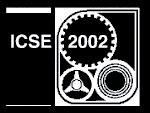 |
|
 |
Home
Conference Updates
Advance Program
Overview
Technical Papers
Conference Keynotes
Tutorials
Workshops
Industry Presentations
State-of-the-Art Presentations
Doctoral Symposium
IMPACT Presentations
Panels
Co-Located Events
Posters and Demos
Exhibitors
Call For Participation
Types of Submissions
Student Volunteers
Conference Calendar
Program At-A-Glance!
Conference Meetings
Conference Information
Conference Committee
Program Committee
Sponsors and Supporters
Advice for Newcomers
Registration
Overview
Travel Information and Events
Overview
Conference Hotel
Discount Airfares
Discount Airport Shuttle
Discount Theme Park Tickets
Securing a Visa
Spouse Program
ICSE 5K Run
Related Conferences
Other ICSE Conferences
ICSE 2002 State-of-the-Art Presentations
ICSE 2002 will feature two State-of-the-Art presentations.
S4.3: Safety-Critical Software

Safety-Critical Systems: Challenges and Directions
by John Knight, University of Virginia
Safety-critical systems are those systems whose failure could result in loss of life, significant property damage, or damage to the environment. There are many well known examples in application areas such as medical devices, aircraft flight control, weapons, and nuclear systems. Many modern information systems are becoming safety-critical in a general sense because financial loss and even loss of life can result from their failure. Future safety-critical systems will be more common and more powerful. From a software perspective, developing safety critical systems in the numbers required and with adequate dependability is going to require significant advances in areas such as specification, architecture, verification, and process. The very visible problems that have arisen in the area of information-system security suggests that security is a major challenge also. This presentation will review the many challenges that we face in this area and suggest technical directions that might be pursued to deal with them.
S6.3: Component Technologies

Distributed Component Technologies and their Software Engineering Implications
by Wolfgang Emmerich, University College London and Zuhlke Engineering (UK) Ltd.
In this state of the art report, we review advances in distributed component technologies, such as the Enterprise Java Beans specification and the CORBA Component Model. We assess the state of the practice for the use of components in industry. We show several architectural styles for whose implementation distributed components have been used successfully. We review the use of iterative and incremental development processes and the notion of model driven architecture using component-specific extensions of the UML. We then assess the state of the art of research into novel software engineering methods and tools for the modelling, reasoning and deployment of distributed components. The open problems identified during this review result in formulation of a research agenda that will lead towards the systematic engineering of distributed systems based on component technologies.


